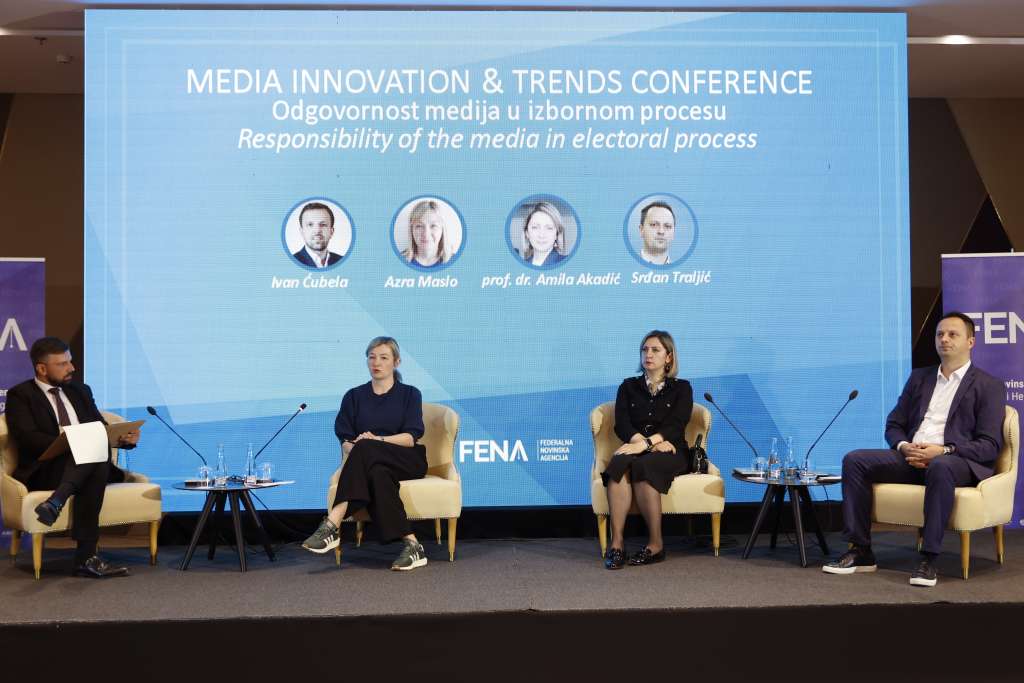SARAJEVO, May 8 (FENA) - The conference "Responsibility of the Media in Electoral Process", which was held today in Sarajevo, organized by the Federal News Agency (FENA) and the OSCE Mission to Bosnia and Herzegovina, began with a panel on the topic "Challenges of use of modern technology in media reporting on elections".
This topic was addressed by Azra Maslo, Head of the Sector for Program Content and Complaints at BiH Communications Regulatory Agency (CRA), professor Amila Akagić from the Faculty of Electrical Engineering in Sarajevo and PR Manager at Transparency International BiH Srđan Traljić.
The moderator of the panel was political scientist Ivan Ćubela, and before the start of the panel, an expert on external influences from Slovakia, Victro Breiner, spoke via video link about the impact of artificial intelligence during the elections in Slovakia, where public opinion was significantly influenced by a large number of so-called deepfake videos.
''We have gathered today at a critical moment for the evolution of the media. Dynamic practices offer new opportunities but also challenges, especially in the context of preserving electoral integrity as a pillar of democracy. Modern technology significantly affects the integrity of elections. There are actors who work against democracy. During the Slovakian elections last year, media organizations found themselves on a new front line, i.e. deepfakes appeared. Media organizations had to deal with the spread of fake footage showing politicians in unethical conversations. They were strategically sent out into the public to wreak havoc. It was important to expose deepfakes, and many media had to quickly realign themselves in order to act proactively and protect elections and democracy,'' said Breiner.
Breiner said that the people who reacted to the deepfake content were from media organizations, but that they faced a huge challenge.
In her address, Head of the Sector for Program Content and Complaints at CRA, Azra Maslo, notes that "we must be the arbiters of the truth at all times in order to be able to respond to modern technological challenges and to hold regular elections".
''The improvement of the competences of each individual is extremely important, while from the point of view of the media, we do not have concrete and explicit powers. The very concept of misinformation is not within the competence of the regulator, but it is true that new technologies bring a large amount of misinformation. The European regulatory framework in the fight against such content has brought laws and mechanisms that recognize responsibility in the fight against harmful content. Marking of deepfake content is also required, and a certain amount of responsibility of all involved actors is also required,'' said Maslo.
Professor Amila Akagić presented research on artificial intelligence in which the effects of artificial intelligence on elections and the consequences of such actions are shown. She referred to media articles from 2023 and 2024 on all that artificial intelligence could influence in the future.
''I don't see any big problems right now, but of course that doesn't mean there won't be any and we have to talk about how to protect ourselves. Certain risks have been singled out, including false information, disinformation, cyber security and others. The concern comes from the potential AI has in the wrong hands. A large number of countries will go to the polls this year. Two billion voters are expected worldwide, and this year is already being called the AI election. It is not known how AI will affect the elections, we have to examine that and it could take ten years. Together we will learn how to protect ourselves,'' explained Akagić.
Srđan Traljić spoke about the elections in BiH and the irregularities that occur during the election process in our country, as well as about all the irregularities that Transparency International notes during the elections. As he said, a large number of complaints about irregularities during the election do not bear fruit due to poor legislation and a lack of evidence, which is why the CEC BiH is most often powerless to react.
''We had a large number of cases of spreading hatred, the CEC BiH acted bravely in such cases and removed such parties from the list, but all of these cases were lost in court due to a lack of evidence. TI BiH tried to calculate how much parties spend on advertising in election campaigns, but data is not available, parties report smaller amounts than what they spend. Key political parties had to submit their advertising price lists to the CEC, but many did not do so. The key political parties presented about two million KM less than the real figure,'' Traljić said.
He added that all participants in the election process must have equal access to the media, which is why better regulations are needed in BiH.
(FENA) A. B.



























